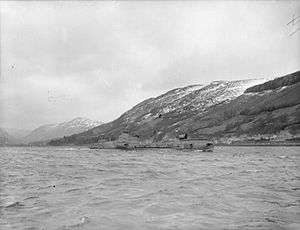HMS Talisman (N78)
 HMS Talisman | |
| History | |
|---|---|
| Builder: | Cammell Laird & Co Limited, Birkenhead |
| Laid down: | 27 September 1938 |
| Launched: | 29 January 1940 |
| Commissioned: | 29 June 1940[1] |
| Fate: | sunk 17 September 1942 |
| Badge: |
 |
| General characteristics | |
| Class and type: | British T class submarine |
| Displacement: |
|
| Length: | 275 ft (84 m) |
| Beam: | 26 ft 6 in (8.08 m) |
| Draught: | 16.3 ft (5.0 m) |
| Propulsion: |
|
| Speed: |
|
| Range: | 4,500 nautical miles at 11 knots (8,330 km at 20 km/h) surfaced |
| Test depth: | 300 ft (91 m) max |
| Complement: | 59 |
| Armament: |
|
The second HMS Talisman (N78), and the first to enter service under the name, was a T-class submarine of the Royal Navy. She was laid down by Cammell Laird & Co Limited, Birkenhead and launched on the 29 January 1940.
Career
Talisman had a relatively short but active career, spending most of her time in the Mediterranean.
One of her first actions was the capture of the French fishing vessel Le Clipper, which was then used to observe U-boat movements off the Gironde estuary before being brought into Falmouth. She later attacked HMS Otus by mistake, but fortunately was unsuccessful. She went on to sink two sailing vessels, the Vichy-French passenger ship Théophile Gautier and the Italian merchant Calitea, as well as destroying the grounded wreck of the German merchant Yalova. She also unsuccessfully attacked the German merchant Salzburg and an Italian convoy, missing the Italian merchant Lauretta, and being heavily depth charged by the escorting Italian torpedo boat Libra.[1]
Sinking
Talisman left Gibraltar on 10 September 1942 carrying supplies to Malta, where she was due no later than 18 November. She reported sighting a U-boat off Philippeville, Algeria on 15 November but was not heard from again and failed to arrive at Malta. She is presumed either to have hit an Italian mine off Sicily or to have been destroyed by Italian surface forces on 17 November. She was declared overdue on 18 September 1942.[2]
Notes
- 1 2 HMS Talisman on Uboot.net
- ↑ Submarine losses 1904 to present day, RN Submarine Museum, Gosport
References
- Akermann, Paul (2002). Encyclopaedia of British Submarines 1901–1955 (reprint of the 1989 ed.). Penzance, Cornwall: Periscope Publishing. ISBN 1-904381-05-7.
- Bagnasco, Erminio (1977). Submarines of World War Two. Annapolis, Maryland: Naval Institute Press. ISBN 0-87021-962-6.
- Colledge, J. J.; Warlow, Ben (2006) [1969]. Ships of the Royal Navy: The Complete Record of all Fighting Ships of the Royal Navy (Rev. ed.). London: Chatham Publishing. ISBN 978-1-86176-281-8. OCLC 67375475.
- Chesneau, Roger, ed. (1980). Conway's All the World's Fighting Ships 1922–1946. Greenwich, UK: Conway Maritime Press. ISBN 0-85177-146-7.
- Kemp, Paul J. (1990). The T-class Submarine: The Classic British Design. Annapolis, Maryland: Naval Institute Press. ISBN 1-55750-826-7.
- McCartney, Innes (2006). British Submarines 1939–1945. New Vanguard. 129. Oxford, UK: Osprey. ISBN 1-84603-007-2.